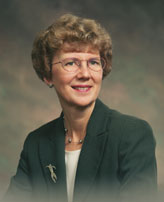

A publication of The Graduate School, University of North Carolina at Chapel Hill
Archives Fall 2001
Home | Back issues | About us | Email your feedback | The Graduate School | UNC-Chapel Hill | Make a gift

 |
We’ve chosen the title of this issue of The Fountain — “How do you say ‘Hello’ in biostatistics?” — very carefully. We have so many outstanding graduate programs at Carolina. Walk into any one department, and you’ll hear a language that would be mostly incomprehensible anywhere else on campus.
To help bridge the disciplinary language divide, we’ve designed programs that give students the opportunity to discuss their research with students from different disciplines. While it’s crucial for students to narrow their research focus to draw meaningful conclusions, it’s also important to learn the languages of other disciplines and the value of teamwork in graduate level research. I think we can credit our interdisciplinary programs for helping many of our students succeed in their post-graduate work.
Scholars for Tomorrow, our newest cross-disciplinary fellowship program, offers donors the opportunity to support a creative new concept in learning that includes interdisciplinary education, cutting-edge research and discovery. The program brings together students from various fields to address a general theme of mutual interest and importance to society. For example, this year nine students from various disciplines across campus will work together to explore the breadth of computational sciences.
In this issue, we’ll update you on the prestigious Royster Fellowship program designed to recruit the nation’s most promising graduate students to Carolina and then help them reach their highest potential. A University-wide program, the Royster Society of Fellows gives students the opportunity to broaden their intellectual horizons by sharing their research ideas and findings with one another.
Meet the Weiss Urban Livability Fellows of 2001, nine exceptional students from various departments who embraced one another’s cultural and academic differences to examine several layers of a new movement in urban living. They presented their research in April to Professors Emeriti Charles and Shirley Weiss, for whom the fellowship is named, as well as students and members of the Chapel Hill community.
Some students have employed an interdisciplinary approach in their research all on their own. We introduce you to Betsy Towns, who combines two loves in her art: sculpting and storytelling. Towns’ sculptures have already gained her a large local following. You’ll also meet Dr. Jonathon Gelfond, a physician who has found a different way to help patients. Now pursuing a Ph.D. in biostatistics with the help of a Kenan Fellowship from the Graduate School, Gelfond says he hopes to combine his clinical expertise and biostatistics to find ways of prevent-ing side effects from drugs and illness.
Also in this issue, learn how the interdisciplinary movement in graduate research began more than a decade ago. Then Dean Lyle Jones, among others, had the foresight to begin encouraging graduate students to engage in interdisciplinary dialogue.
Finally, I’m touched that The Fountain has chosen to feature me in this issue. The article might give you some insight into how my own training as a graduate student led me to understand and appreciate the importance of interdisciplinary learning.
By combining highly focused, top-level research with the opportunity to cross disciplinary boundaries, we’ve been able to provide a learning environment of excellence for our graduate students. I believe the stories in this issue of The Fountain illustrate how students benefit from this special Carolina environment.
-Linda Dykstra
© 2002, The Graduate School, The University of
North Carolina at Chapel Hill
All text and images are property of The Graduate School
at the University of North Carolina-Chapel Hill. Contact Sandra Hoeflich
at shoeflic@email.unc.edu
to request permission for reproduction.
Contact Alexandra Obregon at aobregon@email.unc.edu if you have technical problems with this Web site.